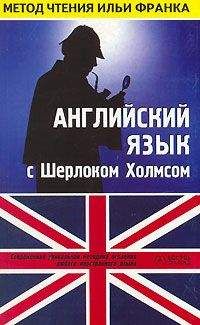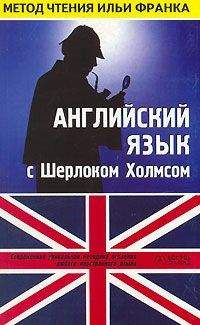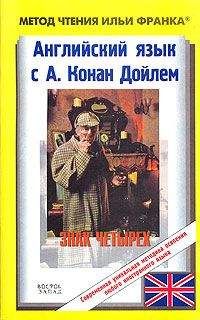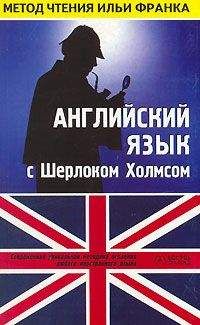grasped [grA:spt], original [@'rIdZIn(@)l], chronicle ['krOnIk(@)l], singular [' [email protected]]
“That’s all right,” said Lestrade, as we parted. “Hill knows all these gentry, and he will give a name to him. You’ll find that my theory of the Mafia will work out all right. But I’m sure I am exceedingly obliged to you, Mr. Holmes, for the workmanlike way in which you laid hands upon him. I don’t quite understand it all yet.”
“I fear it is rather too late an hour for explanations,” said Holmes. “Besides, there are one or two details which are not finished off, and it is one of those cases which are worth working out to the very end. If you will come round once more to my rooms at six o’clock to-morrow, I think I shall be able to show you that even now you have not grasped the entire meaning of this business, which presents some features which make it absolutely original in the history of crime. If ever I permit you to chronicle any more of my little problems, Watson, I foresee that you will enliven your pages by an account of the singular adventure of the Napoleonic busts.”
When we met again next evening (когда мы снова встретились на следующий вечер), Lestrade was furnished with much information concerning our prisoner (Лестрейд сообщил много сведений касательно нашего арестованного; to furnish — снабжать; /пре/доставлять; обеспечивать). His name, it appeared, was Beppo (его имя, как оказалось, Беппо), second name unknown (фамилия: «второе имя» неизвестно). He was a well-known ne’er-do-well among the Italian colony (он был широко известным бездельником в итальянском квартале; ne’er-do-well = never-do-well — ни на что не годный человек, бездельник; to do well — успешно вести дела, преуспевать; colony — колония, поселение; сообщество). He had once been a skilful sculptor (когда-то он был искусным скульптором; skill — искусство, мастерство; умение; навык) and had earned an honest living (и честно зарабатывал на жизнь; to earn — зарабатывать, получать доход; living — средства к существованию: to earn/make a living — зарабатывать на жизнь), but he had taken to evil courses (но /потом/ он сбился с пути: «избрал порочный путь»; to take-took-taken; evil — злой; вредный, порочный; course — курс, направление; линия поведения, образ действия) and had twice already been in jail (и уже дважды побывал в тюрьме) — once for a petty theft (один раз — за мелкую кражу), and once, as we had already heard (и один раз, как мы уже знали), for stabbing a fellow-countryman (за нанесение раны своему соотечественнику; to stab — колоть, наносить удар /кинжалом, ножом/; country — страна, родина). He could talk English perfectly well (он великолепно говорит по-английски).
His reasons for destroying the busts were still unknown (его мотивы к уничтожению бюстов были = для чего он уничтожал бюсты, было по-прежнему неизвестно), and he refused to answer any questions upon the subject (и он отказывался отвечать на любые вопросы об этом: «на эту тему»), but the police had discovered (но полиция выяснила; to discover — раскрыть) that these same busts might very well have been made by his own hands (что эти самые бюсты вполне могли быть изготовлены его руками), since he was engaged in this class of work at the establishment of Gelder & Co (поскольку он занимался этим видом работы в мастерской Гельдера и компании). To all this information (все эти сведения), much of which we already knew (большую часть которых мы уже знали), Holmes listened with polite attention (Холмс слушал с вежливым вниманием), but I, who knew him so well (но я, знающий его хорошо), could clearly see that his thoughts were elsewhere (ясно видел, что его мысли были где-то в другом месте = заняты чем-то другим), and I detected a mixture of mingled uneasiness and expectation beneath that mask (и я заметил смесь беспокойства и ожидания под этой маской; mixture — смесь; to mingle — смешивать/ся/; uneasy — неудобный; беспокойный, тревожный; to detect — различать) which he was wont to assume (которую он имел обыкновение надевать; to be wont to — иметь привычку, обыкновение /делать что-либо/; to assume — принимать, брать на себя; притворяться, напускать).
colony [' [email protected]], honest ['OnIst], answer ['A: [email protected]], listened ['lIs(@)nd], mask [mA:sk]
When we met again next evening, Lestrade was furnished with much information concerning our prisoner. His name, it appeared, was Beppo, second name unknown. He was a well-known ne’er-do-well among the Italian colony. He had once been a skilful sculptor and had earned an honest living, but he had taken to evil courses and had twice already been in jail — once for a petty theft, and once, as we had already heard, for stabbing a fellow-countryman. He could talk English perfectly well.
His reasons for destroying the busts were still unknown, and he refused to answer any questions upon the subject, but the police had discovered that these same busts might very well have been made by his own hands, since he was engaged in this class of work at the establishment of Gelder & Co. To all this information, much of which we already knew, Holmes listened with polite attention, but I, who knew him so well, could clearly see that his thoughts were elsewhere, and I detected a mixture of mingled uneasiness and expectation beneath that mask which he was wont to assume.
At last he started in his chair (наконец он подскочил на стуле; to start — начинать/ся/; вскакивать; вздрагивать, содрогаться), and his eyes brightened (глаза у него заблестели; to brighten — очищать, придавать блеск; проясняться; наполняться радостью; bright — яркий, блестящий; ясный). There had been a ring at the bell (в звонок позвонили; bell — колокольчик, звонок). A minute later we heard steps upon the stairs (минуту спустя мы услышали шаги на лестнице), and an elderly red-faced man (и пожилой краснолицый человек) with grizzled side-whiskers (с седыми бакенбардами; to grizzle — становиться серым, сереть; седеть; делать седым) was ushered in (вошел /в комнату/: «был пропущен в комнату»; to usher in — объявлять, возвещать; to usher — сопровождать; приглашать войти). In his right hand he carried an old-fashioned carpet-bag (в правой руке он держал старомодный саквояж; carpet-bag — саквояж, дорожная сумка; carpet — ковер; bag — мешок; сумка; чемодан), which he placed upon the table (который он поставил на стол).
“Is Mr. Sherlock Holmes here (мистер Шерлок Холмс здесь)?”
My friend bowed and smiled (мой друг поклонился и улыбнулся).
“Mr. Sandeford, of Reading, I suppose (мистер Сэндфорд из Рединга, полагаю)?” said he.
“Yes, sir, I fear that I am a little late (да, сэр, боюсь, я немного опоздал), but the trains were awkward (но /расписание/ поездов /составлено/ неудобно; awkward — неуклюжий; неудобный). You wrote to me about a bust that is in my possession (вы писали мне о бюсте, имеющемся у меня; to write; possession — владение, обладание; собственность).”
“Exactly (совершенно верно; exact — точный).”
brightened [braItnd], carpet ['kA:pIt], bowed [baud], awkward ['O: [email protected]]
At last he started in his chair, and his eyes brightened. There had been a ring at the bell. A minute later we heard steps upon the stairs, and an elderly red-faced man with grizzled side-whiskers was ushered in. In his right hand he carried an old-fashioned carpet-bag, which he placed upon the table.
“Is Mr. Sherlock Holmes here?”
My friend bowed and smiled.
“Mr. Sandeford, of Reading, I suppose?” said he.
“Yes, sir, I fear that I am a little late, but the trains were awkward. You wrote to me about a bust that is in my possession.”
“Exactly.”
“I have your letter here (ваше письмо у меня с собой). You said, ‘I desire to possess a copy of Devine’s Napoleon (вы пишете: «Желаю приобрести копию /бюста/ Наполеона /работы/ Девина»), and am prepared to pay you ten pounds for the one (готов заплатить десять фунтов за тот бюст) which is in your possession (который принадлежит вам).’ Is that right (это так/правильно)?”
“Certainly (несомненно = так оно и есть).”
“I was very much surprised at your letter (я очень удивился вашему письму), for I could not imagine (потому что не могу себе представить) how you knew that I owned such a thing (как вы узнали, что у меня есть такая вещь).”
“Of course you must have been surprised (разумеется, вы были удивлены), but the explanation is very simple (но объяснение очень простое). Mr. Harding, of Harding Brothers, said (мистер Хардинг из /торгового дома/ «Братья Хардинги» сказал) that they had sold you their last copy (что они продали вам последнюю копию), and he gave me your address (и дал мне ваш адрес).”
“Oh, that was it, was it (а, вот как все было)? Did he tell you what I paid for it (а он сказал вам, сколько я заплатил за бюст)?”
“No, he did not (нет, не сказал).”
possession [ [email protected]'zeS(@)n], imagine [I'm&dZIn], address [@'dres]
“I have your letter here. You said, ‘I desire to possess a copy of Devine’s Napoleon, and am prepared to pay you ten pounds for the one which is in your possession.’ Is that right?”
“Certainly.”
“I was very much surprised at your letter, for I could not imagine how you knew that I owned such a thing.”
“Of course you must have been surprised, but the explanation is very simple. Mr. Harding, of Harding Brothers, said that they had sold you their last copy, and he gave me your address.”
“Oh, that was it, was it? Did he tell you what I paid for it?”
“No, he did not.”
“Well, I am an honest man (что ж, я честный человек), though not a very rich one (хотя и не очень богатый). I only gave fifteen shillings for the bust (я отдал за бюст только пятнадцать шиллингов), and I think you ought to know that (думаю, вам следует это знать) before I take ten pounds from you (прежде чем я получу от вас десять фунтов).
“I am sure the scruple does you honour, Mr. Sandeford (несомненно, такая щепетильность делает вам честь, мистер Сэндфорд; scruple — сомнения, колебания; щепетильность). But I have named that price (но я /сам/ назвал эту цену), so I intend to stick to it (и намерен придерживаться ее; to stick to it — упорствовать, стоять на чем-либо; to stick — приклеивать/ся/, липнуть; держаться /чего-либо/, следовать, быть верным /чему-либо/).”
“Well, it is very handsome of you, Mr. Holmes (что ж, это очень любезно с вашей стороны, мистер Холмс; handsome — красивый, статный /о мужчине/; любезный, обходительный). I brought the bust up with me (я захватил с собой бюст; to bring — приносить), as you asked me to do (как вы и просили /меня сделать/). Here it is (вот он)!”
He opened his bag (он раскрыл саквояж), and at last we saw placed upon our table a complete specimen of that bust (и наконец мы увидели поставленный на наш стол = у себя на столе целый экземпляр бюста) which we had already seen more than once in fragments (который уже видели неоднократно: «больше, чем один раз» в осколках).





